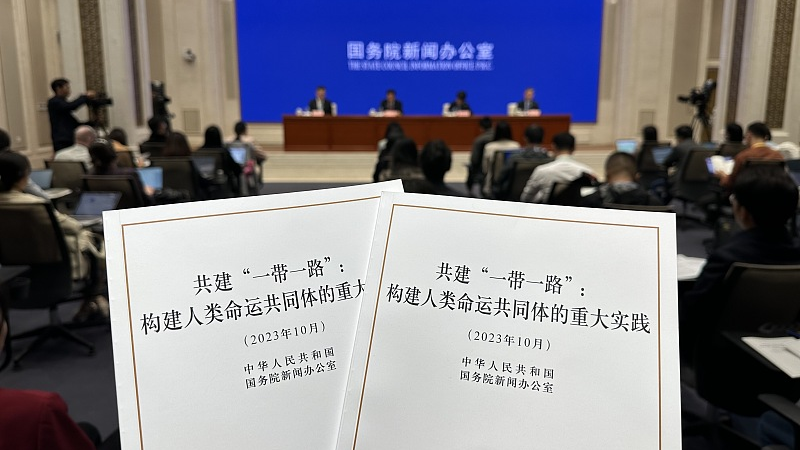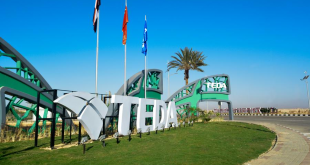Published: October 12,2023
By Ruqiya Anwar

The white paper titled “The Belt and Road Initiative: A Key Pillar of the Global Community of Shared Future” is released at a press conference held by China’s State Council Information Office in Beijing, capital of China, October 10, 2023. /CFP
China’s State Council Information Office has released a white paper titled “The Belt and Road Initiative: A Key Pillar of the Global Community of Shared Future.” This document sheds light on the significance of the Belt and Road Initiative (BRI) and its transformative impact on the global landscape during the past 10 years.
The Chinese government published this white paper to provide the international community with a better understanding of the initiative’s value, facilitate high-quality interaction under it, and eventually offer benefits to more countries and communities, marking a significant turning point in the history of international cooperation and development.
The BRI has roots in history, continuing on the spirit of the old Silk Road, which linked Asia, Europe, and Africa over two millennia ago. These ancient trade routes served as channels for cultural exchange, developing mutual understanding and cooperation among disparate cultures.
The Silk Road spirit, characterized by peace, openness, inclusivity, and mutual benefit, is still relevant today as a guiding philosophy for international interactions. The BRI, which emerged from a rich history of trade and collaboration, has rekindled the optimism of over 150 countries, uniting them in their quest for new dreams and shared prosperity. It is opening up new prospects not only for China but also for the rest of the world.
The BRI proposed by President Xi Jinping in 2013 highlights China’s commitment to strengthening global connectivity and shared development. While the BRI was put forward by China, it is a global joint effort. It embodies the vision of a global community of shared future, emphasizing national solidarity, mutual trust, and win-win cooperation.
Economic globalization has given both opportunities and difficulties to the modern world. While it has accelerated economic growth and technical progress, it has also exacerbated inequality and regional disparities. The BRI responds to the economic globalization imperatives by providing a path to shared growth.
China, as an active participant in economic globalization, has benefited from this process and aspires to share its development possibilities with others. The BRI is consistent with the United Nations’ 2030 Agenda for Sustainable Development and intends to improve global development through higher-quality, inclusive economic integration. The BRI aims to decrease the wealth gap and establish a more equal international economic order by fostering equitable access to the benefits of globalization.
The Rashakai Special Economic Zone under the China-Pakistan Economic Corridor in the northwest Khyber Pakhtunkhwa province of Pakistan, May 23, 2023. /Xinhua
The BRI encompasses more than just economic cooperation; it also includes infrastructure development, trade, cultural interaction, and people-to-people ties. It constructs physical and digital bridges across partner countries, improving transportation networks, energy infrastructure, and telecommunications systems.
This multidimensional approach promotes more mutual understanding and cultural interchange among nations, encouraging harmony and inclusiveness. The BRI thus helps to develop a feeling of shared destiny among many cultures.
The BRI injects positive energy into global peace and development in numerous challenges, ranging from regional conflicts and terrorism to climate change and technological upheaval. It is consistent with the need to establish a global community of shared future in which all nations’ interests are intertwined.
The BRI emphasizes dialogue, cooperation, and shared development as strategies for addressing global concerns. It favors multilateralism and opposes unilateralism and protectionism. By encouraging international cooperation and shared responsibility, the BRI helps to build a more just, equitable, and resilient global governance structure.
Over the past decade, the BRI has made substantial strides, benefiting participating countries and advancing global development. Moreover, rising geopolitical tensions, economic uncertainty, and technological shocks highlight the need for sustained progress in BRI cooperation.
China remains committed to the overarching aims of the BRI and will continue to broaden and deepen its scope and depth. It will foster high-quality growth by increasing openness and cooperation while assisting other developing countries in their efforts to modernize. China aims to strengthen emerging economies’ and developing countries’ voices in global governance, promoting greater equity and inclusivity in the international order.
As the world faces unprecedented challenges, the BRI serves as a beacon of hope, emphasizing the value of solidarity, inclusivity, and win-win cooperation. It reflects a dedication to establishing a worldwide community of shared future in which everyone can live in peace, security, and prosperity. The BRI, with continuing dedication and cooperation, will pave the path for a brighter and more equitable future for humanity, transferring the torch of peace and development from one generation to the next.
Ruqiya Anwar, a special commentator on current affairs for CGTN, is a PhD scholar of Media and Communication Studies in Pakistan.
 Africa -China Review Africa -China Cooperation and Transformation
Africa -China Review Africa -China Cooperation and Transformation
